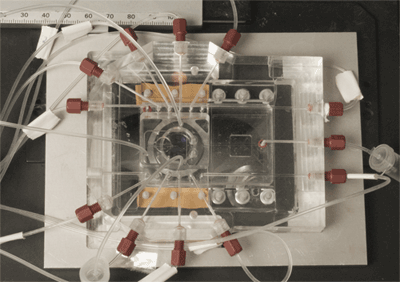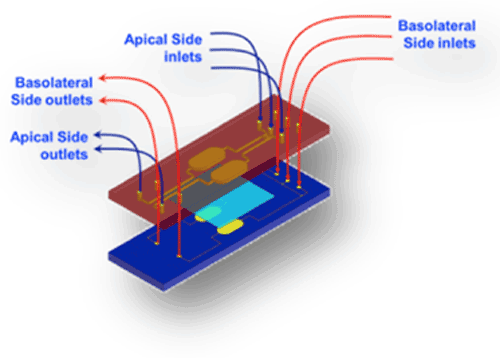Unique computer system to help determine inflammatory risks of certain foods
Researchers have developed an artificial intestine computer to predict the inflammatory response of certain foods on human digestion.

The NutriChip allows researchers to analyze food quality.
The device, dubbed “NutriChip”, is supported by Nano-Tera and Nestlé, and is specifically being developed by Prof. Martin Gijs’s team at the Laboratory of Microsystems 2, located at the École Polytechnique Fédérale de Lausanne, which is one of two Swiss Federal Institutes of Technology.
Even good food can be bad for you
The NutriChip is essentially a miniature artificial intestinal wall that Gijs’s team hopes one day will be used to identify foods that cause inflammation in the human body.
You see, the body’s response to food consumption is incredibly complex. While we know that certain foods have nutritional advantages, we’re not exactly sure whether or not our bodies’ physical response to digesting them is actually good for us after the food’s been fully processed.
“Generally, once a given food has been digested and absorbed by the intestine, it carries certain molecules into the body, such as Palmitic acid,” explains Guy Vergères, a member of the Agroscope Liebefeld-Posieux Research Center, which is collaborating on the project. The molecules set off slight, temporary inflammation as an immune response; biomarkers for this inflammation, notably cytokines, found in the blood signify this response. It’s normal, but it’s also something that should really be monitored. “If this happens over and over for a long period of time, it can set the stage for inflammatory chronic illnesses,” says Vergères.
How NutriChip works
There are two layers to the NutriChip which are connected with a porous membrane:
• The upper portion is made up of a homogenous layer of cultured epithelial cells and is meant to emulate the intestine wall.
• The lower layer is made up of immune system cells (mostly macrophages) and is meant to replicate the circulatory system and immune responses which typically cause indigestion.

Illustrative breakdown of the NutriChip process.
Since most of us weren’t bio-majors, it should be noted that the purpose of microphages is to keep the body clean: when they encounter potentially hazardous agents, they release molecules (like cytokines) to activate other immune-system cells. This is what typically causes the inflammatory response. The NutriChip platform has CMOS high-resolution optical sensors to detect and measure cytokine production on the other side of the layer of intestinal wall cells. The hope is that by measuring the release of these cells (performed using fluorescence) researchers will be able to determine exactly how much inflammation is caused by a given food.
Does milk actually do a body good?
The first food product that the team is testing out is milk, as it is widely consumed by the Swiss general public and has also shown in studies to reduce the concentration of inflammatory biomarkers in humans; results that still need to be confirmed.
In order to test the milk with the NutriChip, the team needs to reproduce every stage in the digestive process before it hits the intestine; that is, the process of it being successively digested by the enzymes and chemical components from saliva, gastric juices, pancreatic juices, and bile. Once this mixture is created, it gets applied to the upper level of the NutriChip, and the platform can begin measuring the microphage’s response.
“On another front, studies are being done on volunteers at the Bern University Hospital to find links between body mass, diet, and pro-inflammatory cytokine production,” says Gijs. “The study participants eat various types of meals, and then afterwards their cytokine levels are measured via a blood test. Blood tests could tell us whether we obtain the same results with the NutriChip artificial intestine.”
If the project team obtains similar results, it will pave the way for in vitro screening of other types of foods to determine their pro- or anti-inflammatory potentials. From there, the most promising foods could then be tested more intensely, via nutritional studies. ■
Via: EPFL press release
Images via: sti.epfl.ch
Advertisement
Learn more about Electronic Products Magazine





